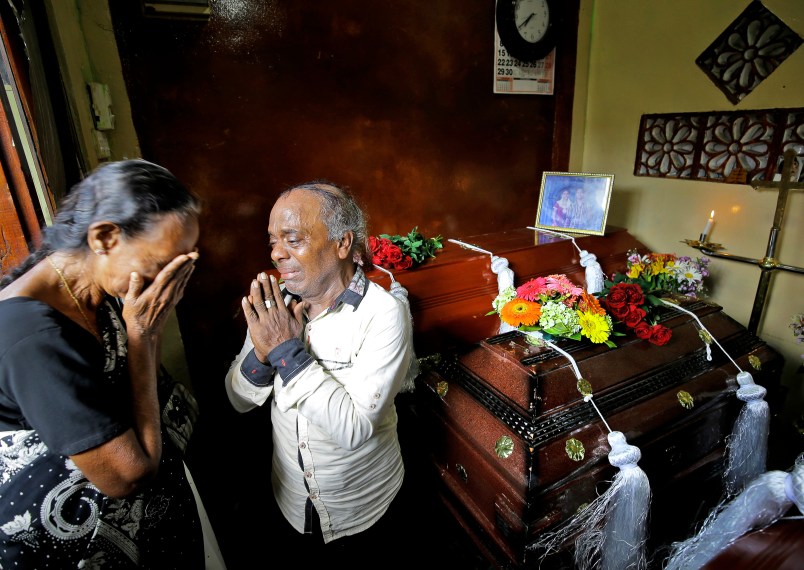COLOMBO, Sri Lanka (AP) — Sri Lanka’s state minister of defense said Tuesday that the Easter attack on churches, hotels and other sites in the South Asian nation was “carried out in retaliation” for the shooting massacre at two New Zealand mosques last month, according to a statement.
The minister, Ruwan Wijewardene, told Parliament the government possessed information that the series of bombings in and outside of Colombo that killed more than 300 people was carried out “by an Islamic fundamentalist group” in response to the Christchurch attacks. He did not provide evidence or explain the source of the information.
Wijewardene blamed “weakness” within Sri Lanka’s security apparatus for failing to prevent the nine bombings.
“By now it has been established that the intelligence units were aware of this attack and a group of responsible people were informed about the impending attack,” he said. “However, this information has been circulated among only a few officials.”
As Sri Lanka’s leaders wrangled with the implications of an apparent homegrown militant attack and massive intelligence failure, security was heightened Tuesday for a national day of mourning and the military was employing powers to make arrests it last used during the devastating civil war that ended in 2009.
The six near-simultaneous attacks on three churches and three luxury hotels and three related blasts later Sunday was Sri Lanka’s deadliest violence in a decade. Wijewardene said the death toll from the attack now stood at 321 people, with 500 wounded.
Word from international intelligence agencies that a local group was planning attacks apparently didn’t reach the prime minister’s office until after the massacre, exposing the continuing political turmoil in the highest levels of the Sri Lankan government.
On April 11, Priyalal Disanayaka, Sri Lanka’s deputy inspector general of police, signed a letter addressed to the directors of four Sri Lankan security agencies, warning them that a local group was planning a suicide attack in the country.
The intelligence report attached to his letter, which has circulated widely on social media, named the group allegedly plotting the attack, National Towheed Jamaar, named its leader as Zahran Hashmi, and said it was targeting “some important churches” in a suicide terrorist attack that was planned to take place “shortly.”
The report named six individuals likely to be involved in the plot, including someone it said had been building support for Zahran and was in hiding since the group clashed with another religious organization in March 2018.
On Monday, Sri Lanka’s health minister held up a copy of the intelligence report while describing its contents, spurring questions about what Sri Lanka police had done to protect the public from an attack.
It was not immediately clear what steps were taken by any of these security directors. Disanayaka did not answer calls or messages seeking comment.
Among the 40 people arrested on suspicion of links to the bombings were the driver of a van allegedly used by the suicide attackers and the owner of a house where some of them lived.
Heightened security was evident at an international airport outside the capital where security personnel walked explosive-sniffing dogs and checked car trunks and questioned drivers on roads nearby. Police also ordered that anyone leaving a parked car unattended on the street must put a note with their phone number on the windscreen, and postal workers were not accepting pre-wrapped parcels.
A block on most social media since the attacks has left a vacuum of information, fueling confusion and giving little reassurance the danger had passed. Even after an overnight curfew was lifted, the streets of central Colombo were mostly deserted Tuesday and shops closed as armed soldiers stood guard.
Prime Minister Ranil Wickremesinghe said he feared the massacre could unleash instability and he vowed to “vest all necessary powers with the defense forces” to act against those responsible.
Authorities said they knew where the group trained and had safe houses, but did not identify any of the seven suicide bombers, whose bodies were recovered, or the other suspects taken into custody. All seven bombers were Sri Lankans, but authorities said they strongly suspected foreign links.
Also unclear was a motive. The history of Buddhist-majority Sri Lanka, a country of 21 million including large Hindu, Muslim and Christian minorities, is rife with ethnic and sectarian conflict.
In the nation’s 26-year civil war, the Tamil Tigers, a powerful rebel army known for using suicide bombers, had little history of targeting Christians and was crushed by the government in 2009. Anti-Muslim bigotry fed by Buddhist nationalists has swept the country recently.
In March 2018, Buddhist mobs ransacked businesses and set houses on fire in Muslim neighborhoods around Kandy, a city in central Sri Lanka that is popular with tourists.
After the mob attacks, Sri Lanka’s government also blocked some social media sites, hoping to slow the spread of false information or threats that could incite more violence.
Sri Lanka, though, has no history of Islamic militancy. Its small Christian community has seen only scattered incidents of harassment.







Maybe, but …
How is this different from baseless speculation?
“By now it has been established that the intelligence units were aware of this attack and a group of responsible people were informed about the impending attack,” he said. “However, this information has been circulated among only a few officials.”
Point taken.
We can discount this as official Sri Lankan policy, since it wasn’t in the form of a tweet. Nothing happens in the forest unless someone is there to tweet about it.
Sort of like your lunch must have sucked today, I didn’t see you post a photo of it on Facebook.
“Anti-Muslim bigotry fed by Buddhist nationalists has swept the country recently.
In March 2018, Buddhist mobs ransacked businesses and set houses on fire in Muslim neighborhoods around Kandy, a city in central Sri Lanka that is popular with tourists.”
Jesus wept. And so did Gautama.